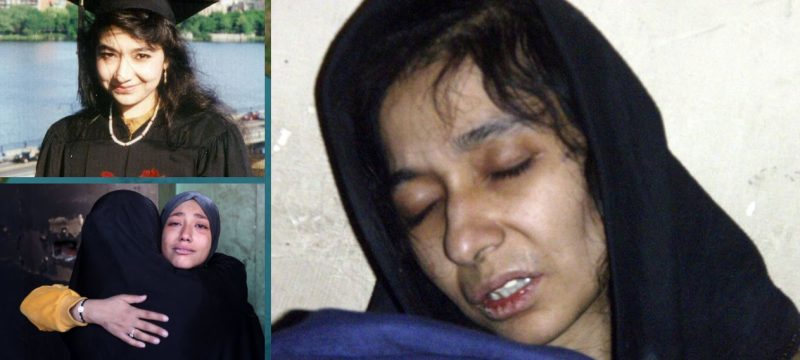The Aafia Siddiqui case has been at the center of a long-standing debate on justice, human rights, and international law. Siddiqui, a Pakistani neuroscientist, was convicted in 2010 for attempting to kill U.S. soldiers while she was in custody in Afghanistan. Her case has raised serious concerns about the treatment of detainees, the fairness of trials, and the broader issues of human rights. This article provides a detailed look at the Aafia Siddiqui case, highlighting the legal challenges and controversies that continue to surround her conviction.
Read Aslo : IHC Demands Answers from Cabinet in Aafia Siddiqui Case
The Incident That Sparked the Legal Battle
In 2008, Aafia Siddiqui was arrested in Afghanistan after being accused of attempting to shoot U.S. soldiers while in custody. According to reports, she was detained by Afghan police after allegedly carrying explosives. Following her arrest, she was transferred to U.S. custody, where she faced charges related to her actions during detention.
The trial, which took place in New York, led to Siddiqui’s conviction in 2010. She was sentenced to 86 years in prison for attempting to kill U.S. military personnel. However, her conviction has been met with widespread criticism, especially in Pakistan and other parts of the world. Siddiqui’s supporters claim that the trial was deeply flawed and that her actions were misrepresented.
Avoiding help for the Daughter of the Nation❓
— Aafia Movement (@Aafiamovement) July 21, 2025
In today’s IHC hearing, the judge expressed deep dismay at the Govt’s continued inaction on Dr. Aafia Siddiqui’s case.
“Despite repeated orders, the Govt failed to respond, this is contempt of court.” pic.twitter.com/QFDF9tzjk6
Controversies and Claims of Torture
One of the most significant aspects of the Aafia Siddiqui case is the widespread allegation of torture and mistreatment. Siddiqui’s family and various human rights organizations, including Amnesty International, have alleged that she was subjected to torture during her detention. These claims have sparked outrage, with many questioning the methods used by U.S. authorities during her time in custody.
Siddiqui’s supporters argue that she was wrongfully detained and subjected to unjust treatment by both Afghan and U.S. authorities. They maintain that she was not given a fair trial and that the evidence against her was insufficient. Moreover, the circumstances of her capture and detention have raised further concerns, as she was allegedly held in secret prisons for several years before being formally charged.
Global Outcry and Legal Efforts for Her Release

The Aafia Siddiqui case has sparked global outcry, particularly in Pakistan, where Siddiqui is considered a symbol of injustice. Pakistani leaders have consistently called for her release, while human rights organizations continue to push for a fair trial and investigation into the allegations of torture. These efforts, however, have not led to any significant changes in her legal status.
In 2018, the United Nations Special Rapporteur on Torture called for a full investigation into Siddiqui’s treatment, further adding to the international pressure on the U.S. government. Despite these calls, Siddiqui remains imprisoned in the U.S., with her legal team continuing to file appeals and seek a review of her case.
The Political Dimensions of the Case
The Aafia Siddiqui case is not just a legal matter; it is also a politically charged issue. Siddiqui’s arrest and conviction have strained relations between the United States and Pakistan. Many Pakistani citizens see Siddiqui as a victim of U.S. aggression and an unfair legal system. Her case has become a rallying point for anti-American sentiment in Pakistan, with protests often erupting in response to developments in her case.
Furthermore, the case has drawn attention to the broader issue of detainee rights in the context of the War on Terror. Siddiqui’s situation is seen by many as part of a larger pattern of human rights violations committed in the name of national security. The controversy surrounding her trial has fueled global debates on the ethics of counterterrorism measures and the treatment of detainees.
Ongoing Legal Struggles and the Path Forward
Despite numerous appeals and efforts to overturn her conviction, Siddiqui’s legal struggles continue. Her case remains a prominent example of the challenges faced by individuals caught in the complexities of international legal systems. The Aafia Siddiqui case is likely to continue to attract attention from human rights groups, political leaders, and the global community.
As of now, Siddiqui’s situation remains unresolved, with no clear path forward. The debate over her treatment is far from over, and the case continues to be a focal point in discussions on the fairness of U.S. legal proceedings, the treatment of detainees, and the broader issues of justice in the War on Terror.
The Aafia Siddiqui case is a significant legal and political issue that raises important questions about human rights, justice, and international law. Siddiqui’s conviction has sparked widespread controversy, with claims of torture and unfair treatment during her detention. Despite years of legal battles, her case remains unresolved, and the global debate over her situation continues. As efforts for her release persist, the Aafia Siddiqui case will likely remain a key topic in discussions about justice and detainee rights.







